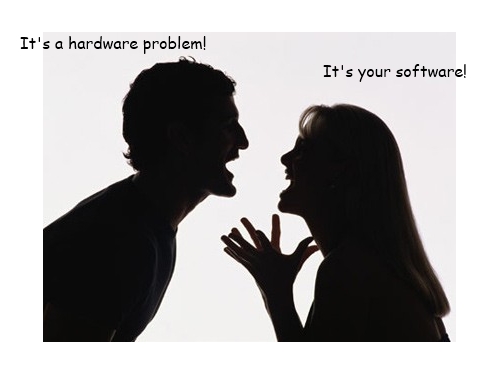Frankly, I'm OK with a Microsoft tablet computer

[caption id="attachment_538" align="alignright" width="400" caption="Where do you want to go tomorrow when you need a resolution?"]
If this truly is, as many of my colleagues have opined, the Post PC Era, Microsoft's tablet computer is a natural evolution of kind. I don't really see the point in spreading or feeling so much bile about it. Sure, I poked a bit of fun at the Surface when I heard that Microsoft was really branding its very own tablet computer. But, after reading the negative commentary on ZDNet and elsewhere, I have to tell you, I think it's a good thing.
Yes, Microsoft has put itself in somewhat of a competitive position with some of its vendors but that's business, I guess. The fact that Microsoft had the gall to do it really impresses me. Seriously.
Let's face it, Microsoft's Windows operating system is THE choice for business desktops. You have to admit it. The natural and logical next step is to produce a Windows-based tablet computer. I think the fact that now businesses have a total Microsoft option is good. Other companies have done this sort of thing for years.
The list of companies that develop an OS to run on their own hardware is pretty long.
Digital, Compaq, HP, IBM, Sun, Apple, SGI and others do it and have done it. Why not? For superior performance and excellent support, it's the best option.
Why? Because this way, you don't have the classic finger pointing that goes on between hardware and software vendors during a troubleshooting episode. If you ran Solaris 8 on an E10K, Sun knew exactly how to fix it. If you had AIX on an IBM PowerPC system, you were golden. When I worked for WorldCom, I could call HP support, give them my system serial number and the guy on the phone knew exactly how my system board DIP switches should be set. The same goes for all of the single vendor hardware-software combined solutions. It makes perfect sense if you've ever actually worked in an IT support role.
Yes, I know Microsoft-bashing is fun and I've done a bit of it myself over the years. But, when it really boils down to resolving a problem on a system that I'm responsible for, I know that I can pick up the phone, dial Microsoft's support line and get my problem resolved. They have never failed me. And, I've thrown some tough problems to them over the years.
I've had Microsoft actually provide me with "custom" fixes for problems that they didn't have a public fix for. They've helped me many times over the past 20-ish years and I'm grateful. Their latest assistance saved me at least 40 hours worth of reimaging, reinstallation, reconfiguration and rehashing documentation that had passed through many hands. Again, grateful.
If Microsoft produced their own server hardware, I'd be a fan of that too. I can only imagine how frustrating it is to answer a support call and have to deal with a system built with an unlimited possible array of hardware parts. Not an easy task.
You don't have that issue with standardized hardware. It is for this reason that Apple never allowed clones of their systems. They were smart enough to know that it opens up too much potential for failure. Apple-branded hardware means consistency. That's why Apple products, "just work." Microsoft's tablets will have the same effect: Consistency. They will work too.
I like consistency. It makes my life easier. It also makes my support calls a lot less frustrating.
Therefore, I'm perfectly OK with a Microsoft tablet computer.
The other thing I look forward to in a Microsoft tablet? The fact that it will fit into a Microsoft network without a great deal of effort on my part. I won't need "an App for that" because support for whatever it is that I need will be built into the device by default.
I'll be able to logon to a domain, map drives, get Outlook mail, run Microsoft Office, dock a keyboard, attach a monitor and manage my Windows servers with a Microsoft tablet. Yes, I'd probably be able to do all that with any random vendor's Windows-based tablet but I know the Microsoft one will do it. And, if something goes wrong, I can call that single vendor and get resolution.
Say what you want about Microsoft's decision to brand a piece of hardware. Frankly, I'm OK with it.
What do you think? Do you think that your company will buy into Microsoft-branded tablets for the reasons I've given or do you think they'll go in some other direction? Talk back and let me know.
Related Stories:
The tablet surface just got weirder. But wait, there’s more.
Windows tablet speculation overblown
Is Surface Microsoft’s last-gasp pitch to keep IT shops Windows-only?